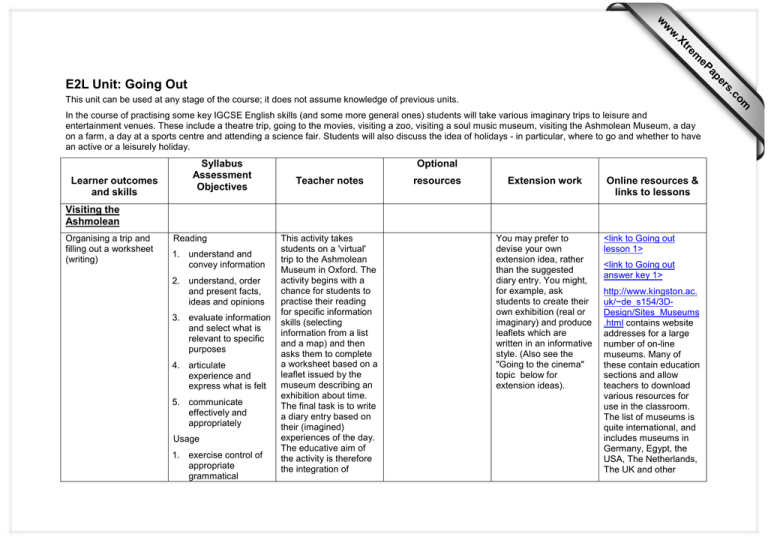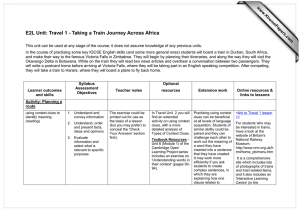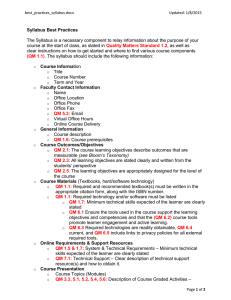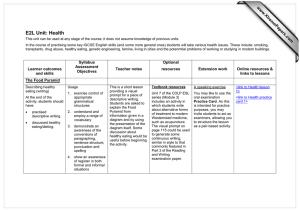E2L Unit: Going Out
advertisement

s er ap eP m e tr .X w w w E2L Unit: Going Out om .c This unit can be used at any stage of the course; it does not assume knowledge of previous units. In the course of practising some key IGCSE English skills (and some more general ones) students will take various imaginary trips to leisure and entertainment venues. These include a theatre trip, going to the movies, visiting a zoo, visiting a soul music museum, visiting the Ashmolean Museum, a day on a farm, a day at a sports centre and attending a science fair. Students will also discuss the idea of holidays - in particular, where to go and whether to have an active or a leisurely holiday. Learner outcomes and skills Syllabus Assessment Objectives Optional Teacher notes resources Extension work Online resources & links to lessons Visiting the Ashmolean Organising a trip and filling out a worksheet (writing) Reading 1. understand and convey information 2. understand, order and present facts, ideas and opinions 3. evaluate information and select what is relevant to specific purposes 4. articulate experience and express what is felt 5. communicate effectively and appropriately Usage 1. exercise control of appropriate grammatical This activity takes students on a 'virtual' trip to the Ashmolean Museum in Oxford. The activity begins with a chance for students to practise their reading for specific information skills (selecting information from a list and a map) and then asks them to complete a worksheet based on a leaflet issued by the museum describing an exhibition about time. The final task is to write a diary entry based on their (imagined) experiences of the day. The educative aim of the activity is therefore the integration of You may prefer to devise your own extension idea, rather than the suggested diary entry. You might, for example, ask students to create their own exhibition (real or imaginary) and produce leaflets which are written in an informative style. (Also see the "Going to the cinema" topic below for extension ideas). <link to Going out lesson 1> <link to Going out answer key 1> http://www.kingston.ac. uk/~de_s154/3DDesign/Sites_Museums .html contains website addresses for a large number of on-line museums. Many of these contain education sections and allow teachers to download various resources for use in the classroom. The list of museums is quite international, and includes museums in Germany, Egypt, the USA, The Netherlands, The UK and other structures 2. understand and employ a range of vocabulary 3. demonstrate an awareness of the conventions of paragraphing, sentence structure, punctuation and spelling 4. show an awareness of register in both formal and informal situations reading and writing skills. areas/countries. If your students can access the Internet themselves, you could invite them to locate an interesting article from one of these sites which could then be used to extend this activity. Learner outcomes and skills Syllabus Assessment Objectives Optional Teacher notes resources Extension work Play the conversation featured in the exercise. Module 3 of the COLP series devotes an entire chapter to technological change in the modern world. The first few pages (87-91) offer an interesting reading comprehension on the development of clockwork technology. The emphasis on technical language could be enhanced by asking students to attempt a writing exercise in which they produce a scientific report. You could, for example, ask them to consider Professor Martin's advice on conducting an experiment in a scientific and objective manner and ask them (perhaps in small groups) to propose a hypothesis that they wish to test. If possible, they could then conduct the experiment, collect data, analyse the data and write down their conclusion(s). In this way they will be practising writing in an objective, factual and formal style. Online resources & links to lessons Attending a science fair Listening to technical and scientific language (listening Listening 1. understand and convey information 2. understand, order and present facts, ideas and opinions 3. evaluate information and select what is relevant to specific purposes 4. recognise implicit attitudes Students listen to three elements of a science fair: 1) Ideas proposed by students which could be used to design a science display/experiment, 2) The explanation of a scientific process (in this case, milk treatment processes), and 3) A speech given by a visiting scientist defining the Scientific Method. Each activity increases in length and in the difficulty of its content. <link to Going out lesson 2> <link to Going out answer key 2> Learner outcomes and skills Syllabus Assessment Objectives Optional Teacher notes resources Extension work Online resources & links to lessons A day at the theatre Producing leaflets and informative letters and preparing to interview an actor for the school magazine (writing) Reading 1. understand and convey information 2. understand, order and present facts, ideas and opinions 3. evaluate information and select what is relevant to specific purposes Usage 1. show an awareness of register in both formal and informal situations Speaking 1. understand and convey information 2. communicate effectively and appropriately Students will practise their organisational skills, their presentation skills and their writing skills by producing a leaflet to promote the upcoming school theatre trip which is being arranged by the IGCSE Drama group. The play that they are going to see is Macbeth by William Shakespeare. The students will also get the chance to pose questions for an interview with one of the actors in the play, Charles Stewart, who is playing Macbeth. You could 'hot seat' Macbeth and invite the class to interview him to try to elicit what his thoughts and feelings were after he had committed the initial act of murder. You could also extend this activity into oral work on asking appropriate questions by role-playing the interview with an actor playing Macbeth. The suggested five questions at the end of the lesson could be used to initiate a role play. <link to Going out lesson 3> <link to Going out answer key 3> There are many sites on the work and plays of William Shakespeare, but most of these would be of more use to those studying literature (a good example is Spark Notes, which can be found at http://www.sparknotes.c om/). If you have students who may be interested in finding out more about the life of the theatre, try the UK National Theatre site at http://www.ntonline.org/education.ht ml, which includes a page on careers in the theatre and some downloadable drama resource packs. Learner outcomes and skills Optional Syllabus Assessment Objectives Teacher notes resources Extension work Online resources & links to lessons Choosing a holiday Trying to persuade a friend to go on a particular holiday (speaking) 1. One or two pairs are selected by the teacher to conduct their conversations with the whole class as audience. 2. The performance is discussed in pairs, and marks are allocated using the assessment criteria grid. The aims of the information and exercises included in this lesson are to: · provide information for teachers and students regarding assessment criteria · suggest activities that will enable students to satisfy these criteria 3. The assessments are collated, discussed, and compared with a similar · provide material for use in these assessment made by activities. the teacher. At the end of this activity there is an oral examination Practice Card. Pairs may devise 'briefing' cards to be used by other pairs. Experience of this activity can be used to stimulate a whole class or small group discussion of effective and appropriate techniques to use when attempting to persuade. <link to Going out lesson 4> <link to Going out student task notes> <link to assessment criteria used in assessing oral tests> <link to Going out Practice card 4> Learner outcomes and skills Optional Syllabus Assessment Objectives Teacher notes resources Extension work Visiting the 'Museum of Soul' is a way to invite students to read about the history of 'Soul' music. It is hoped that students will find it interesting to read about a part of musical history and that this may encourage expansion of the theme. As the reading material is quite long it is suggested that if you choose to use this activity you approach the lesson in sections perhaps inserting some of the suggested extension work at appropriate stages. The activity allows students to practise a range of comprehension skills: Students may like to work in research groups to present projects on musical styles, movements, fads, subcultures, fashions, etc. The Internet is a useful resource for such information. The activity is focused almost entirely on reading skills. You may like to extend it by encouraging students to respond orally. A way in which this could be achieved is by using the practice oral assessment card below. As this is intended for practice purposes, you may invite students to act as examiners, allowing you to structure the lesson as a pair-based activity. Online resources & links to lessons Visiting the Museum of Soul Looking at comprehension methods - summarising and making notes (reading and writing) Reading 1. understand and convey information 2. understand, order and present facts, ideas and opinions 3. evaluate information and select what is relevant to specific purposes 4. articulate experience and express what is felt 5. communicate effectively and appropriately · conveying understanding by means of writing a summary. · conveying <link to Going out lesson 5> <link to Going out answer key 5> understanding by looking for the wider meaning of anecdotes. · conveying understanding by making notes. The museum 'tour' is split into sections (using headings) and each of the three comprehension methods above utilises different sections. Learner outcomes and skills Syllabus Assessment Objectives Optional Teacher notes resources Extension work Online resources & links to lessons A day at a sports centre Listening to sports announcements and a professional sportsman's speech (listening) Listening 1. understand and convey information 2. understand, order and present facts, ideas and opinions 3. evaluate information and select what is relevant to specific purposes 4. recognise implicit attitudes This is primarily intended as a listening activity in which students hear some announcements in a sports centre and a speech given by Dale Newsome, a professional tennis player. In his speech Dale talks about how his career in tennis developed from being an amateur player to turning professional. You will notice that the first exercise is more suitable for less advanced students and uses a multiple-choice format, whereas the exercise based on the speech invites a written response and allows the student to convey understanding by employing some of his or her own words. Another listening activity related to sport can be found in the COLP series of texts (Module 3, page 61). The South African rugby player, Chester Williams, talks about himself and his game. It may be interesting for your class to hear about some of the sporting and leisure activities that their classmates take part in. Extending the focus on speeches, you could ask students to write down a short speech in which they convey an experience they have had at a sports centre - it may be positive or negative, and it could be conveyed in anecdotal form. However, you may prefer to follow up by focussing on a writing exercise. A suggestion here might be to ask students to write a short letter to their local sports centre in which they either commend the centre or complain about it (but not both) - thus giving them practice in writing for a specific purpose. <link to Going out lesson 6> <link to Going out answer key 6> Learner outcomes and skills Optional Syllabus Assessment Objectives Teacher notes resources Extension work Online resources & links to lessons Active holidays Discussing and debating whether holidays should be active or leisurely (speaking) The aims of the information and exercises included in this lesson are to: · provide information for teachers and students regarding assessment criteria · suggest activities that will enable students to satisfy these criteria · provide material for use in these activities. At the end of this activity there is an oral examination Practice Card. The exercise could be repeated with different pairs and topics. Students should be reassured that examiners are trained to avoid 'yes', 'no' questioning. <link to Going out lesson 7> <link to Going out Practice card 7> Learner outcomes and skills Syllabus Assessment Objectives Optional Teacher notes resources Extension work The content of this lesson is intended to be quite simple in order for the grammatical focus of the lesson to be enhanced. The purpose is to identify categories of nouns and pronouns, and to illustrate how pronouns should be clearly linked to their antecedents. Some of the content in the article is referred to in the lesson and the exercises but this is not intended as an activity where students can engage with the practice and principles of farming. Textbook resources On pages 49 and 50 of Module 3 in the COLP textual series, there is a 30 minute activity which allows students to practice their use of pronouns and their antecedents. As this activity has focused on grammar and usage, some relief may be offered to the students by playing an 'oral' pronoun game. Ask each student in turn to identify a noun and to refer to it only by using pronouns. Descriptive words are allowed, indeed encouraged. Try to get students to use the full range of pronouns and not just 'it' - mine, ours, yours, his, hers, theirs. The other students have to guess the noun that is being described. Online resources & links to lessons A day on the farm Using nouns and pronouns (writing) Usage 1. exercise control of appropriate grammatical structures 2. understand and employ a range of vocabulary 3. demonstrate an awareness of the conventions of paragraphing, sentence structure, punctuation and spelling <link to Going out lesson 8> <link to Going out answer key 8> As a project-based extension, you may like to ask students or groups to investigate and have some fun with collective nouns. If so, have a look at these sites: http://www.sonic.net~melisskbeastly.html#Nouns Learner outcomes and skills Syllabus Assessment Objectives Optional Teacher notes resources Extension work Two 'classic' horror movies are used to teach students reviewing skills and how to support their statements with reasons and/or argument. There is also a film trivia quiz to conclude the activity. Textbook resources Marion Barry's book Success International devotes a chapter to 'Entertainment' with a focus on reading about and reviewing films on pages 77 to 84. Included is a short exercise which enables students to become familiar with some of the vocabulary associated with filmmaking. You could conduct mock movie interviews. Most students are familiar with recent films and many of the more famous film actors and actresses. To practice speaking in a nonexamination context you could ask your students to work in pairs, in which one pretends to be an actor/actress and the other is an interviewer sent by the local TV station. You may like to select a few of the better ones for the whole class to watch. Online resources & links to lessons Going to the cinema Writing reviews and supporting statements (writing) Reading 1. understand and convey information 2. understand, order and present facts, ideas and opinions 3. evaluate information and select what is relevant to specific purposes 4. articulate experience and express what is felt 5. communicate effectively and appropriately Usage 1. exercise control of appropriate grammatical structures 2. understand and employ a range of vocabulary 3. demonstrate an awareness of the conventions of <link to Going out lesson 9> <link to Going out answer key 9> If you would like to extend the theme of films, The Internet Movie Database at : http://uk.imdb.com contains a vast amount of information, reviews, trivia, clips, etc. of thousands of films. paragraphing, sentence structure, punctuation and spelling 4. show an awareness of register in both formal and informal situations Learner outcomes and skills Syllabus Assessment Objectives Optional Teacher notes resources There are three stages/elements comprising this activity, each practising a particular skill. The first stage shows by example how students can check their gist understanding of a piece of writing (by using their own words to paraphrase the original). This is followed by an oral exercise, telling an anecdote (help on how to do this is given in the student lesson notes). The final element focuses on the use of adjective collocations and suggests a word game based on six zoo animals - allowing students to explore the use of various adjectives and to check the accuracy of their usage. Marion Barry includes a section on using adjectives (including collocations) to describe people - this could be used to contrast words used to describe animals and people. See pages 1518 of Success International. Extension work Online resources & links to lessons Visiting the zoo Reading for gist, telling an anecdote, and using adjective collocations (reading and speaking) Reading 1. understand and convey information 2. understand, order and present facts, ideas and opinions 3. evaluate information and select what is relevant to specific purposes Usage 1. understand and employ a range of vocabulary 2. show an awareness of register in both formal and informal situations Speaking 1. understand and convey information 2. articulate experience and express what is felt 3. communicate effectively and As a suggested writing exercise (reading, speaking and listening are all covered in the lesson) you might like to present one of the following to your students: · Consider the views expressed about zoos and write a short essay of about 200 words in which you respond to the views. · Consider the views expressed about zoos and write a short essay of about 200 words in which you present your own view about zoos. "Zoos are terrible places. the animals are kept in small, unnatural enclosures and cages and they should really be free to roam their <link to Going out lesson 10> <link to Going out answer key 10> appropriately natural habitats." "We need more specialist researchbased zoos so that we can study certain animals and help some species to survive and increase their numbers." "I don't mind zoos, but only if efforts are made to build cages which resemble the animals' natural habitats. And animals which roam across large areas in their natural habitat should not be kept in zoos." "If we didn't have zoos, how would children learn about animals? Zoos are vital for educating young (and old) people." NB: This exercise is intended to give students practice at one of the writing exercises that they may have to complete in the Reading and Writing examination paper.




